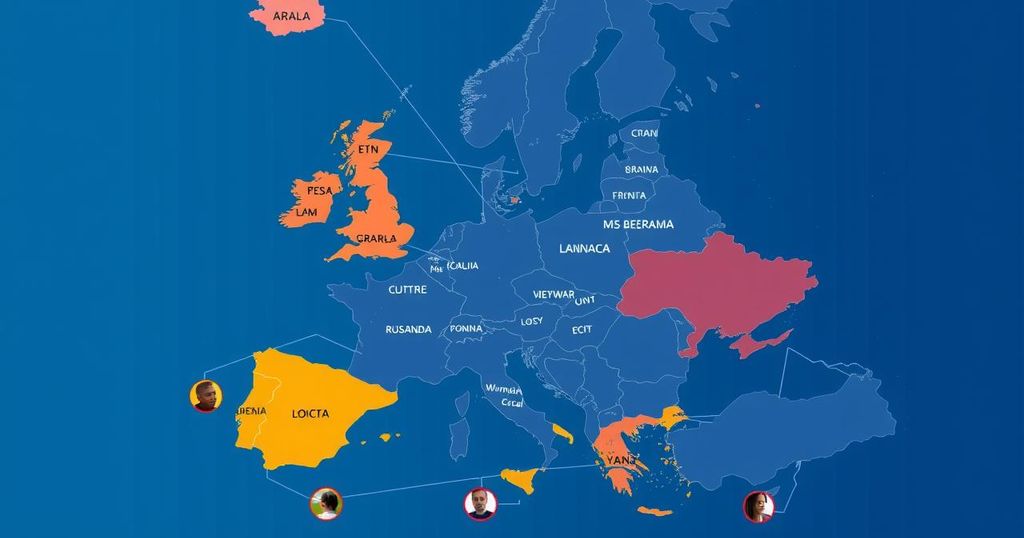EU Explores New Strategies for Handling Unwanted Migrants: Potential Collaborations with Uganda and Uzbekistan

The European Union is investigating new strategies for deporting unwanted migrants, including the creation of “return hubs” and potentially relocating individuals to third-party countries. This shift toward harsher migration policies reflects growing anti-immigration sentiment within the bloc, leading to discussions about using countries like Uganda and Uzbekistan as possible destinations for deported asylum seekers. While the right to asylum is still emphasized, practical challenges and human rights concerns over these proposals remain prominent.
The European Union (EU) is contemplating new strategies to manage unwanted migrants following the endorsement of unconventional proposals by the bloc’s leaders. This approach, reminiscent of the abandoned UK initiative to deport unsuccessful asylum seekers to Rwanda, includes the exploration of establishing “return hubs” and the potential relocation of individuals granted asylum to third-party safe nations. Recently, Polish Prime Minister Donald Tusk secured implicit EU support for a plan to suspend asylum rights, citing increasing border crossings from Belarus. European Commission President Ursula von der Leyen stated that member states must adopt “temporary and appropriate” measures to manage the burgeoning issues surrounding asylum. The agreements made during a late-night EU summit underscore the escalating influence of anti-immigration sentiments in Brussels, particularly following significant electoral victories for hard-right parties in Austria, Germany, and the Netherlands. However, the practicality of implementing these new policies remains in question, especially in light of existing laws that protect individuals from being sent to regions of conflict. No specific countries have been confirmed as potential hubs for deportees; however, the Dutch government has proposed Uganda, while Italy advocates for returning refugees to Syria. Additionally, discussions between German officials and Uzbekistan regarding the reception of deported migrants in exchange for favorable labor regulations have become prominent. Despite this, Chancellor Olaf Scholz has resisted adding Tunisia, Morocco, and Algeria to the list of designated safe countries. Italy’s initiative to process asylum claims at a facility in Albania has encountered initial challenges, with four out of the first sixteen Mediterranean migrants needing to return to Italy due to concerns over their ages and health conditions. In a joint statement from the EU summit, leaders emphasized the necessity of exploring new methods for preventing irregular migration, urging coordinated actions to expedite deportation processes. One noteworthy assertion came from Dutch Prime Minister Dick Schoof, who indicated that engaging in dialogues concerning Uganda’s potential acceptance of African migrants rejected for asylum could be a viable solution. He remarked, “These are innovative solutions that should in principle interest our colleagues here.” The EU notes that only 20% of migrants denied residence permits are currently deported back to their countries. There have been varied responses from Uganda regarding this proposition. While Foreign Minister Jeje Odongo suggested openness to discussions, junior minister Okello Oryem downplayed the likelihood, citing Uganda’s commitment to already sheltering 1.6 million refugees from regions including Sudan, South Sudan, and the Democratic Republic of Congo. Despite rising international concerns regarding human rights, Uganda has progressed economically, moving from a “low” to a “medium” rating on the UN development index. Past attempts by the British government to transfer asylum seekers to Rwanda, involving significant financial promises, were eliminated by the current administration, deeming them unfeasible. Although some countries are considering returning migrants to Syria, the EU maintains that the right to asylum remains fundamental. German Interior Minister Nancy Faeser stressed that this right is “not negotiable for us” while advocating for harsher asylum procedures. As the bloc prepares for anticipated refugee surges, the need to process these individuals in Europe remains paramount, with the EU’s new plan to fast-track border claim dismissals not rolling out until at least 2026. Italy’s agreement with Albania involves transferring an estimated 3,000 male migrants monthly after they are intercepted at sea, with their cases adjudicated remotely by Italian judges. The Italian government has committed approximately $700 million to support this five-year agreement and is positioning itself as a key player in Albania’s EU membership aspirations by 2030. Additionally, both Germany and non-EU United Kingdom have expressed interest in cooperation with Albania regarding migrant management. Overall, cooperation amongst EU nations appears necessary to alleviate the pressures of ongoing migration challenges.
The current discourse around handling unwanted migrants within the European Union (EU) highlights significant shifts in policy formulation concerning asylum seekers. With rising anti-immigration sentiments across the bloc, particularly spurred by hard-right political successes in several member states, the EU’s leadership has begun to reconsider previous stances on asylum rights. The proposal to establish “return hubs” reflects a more stringent and innovative approach to managing migrant inflows, challenging established norms while raising human rights concerns. Countries like Uganda, Uzbekistan, and Albania feature prominently in discussions regarding potential collaboration in deportation strategies, as the EU grapples with balancing humanitarian obligations against internal political pressures to curb irregular migration.
In conclusion, the European Union’s exploration of relocation strategies for unwanted migrants signifies a pivotal moment in its approach to immigration policy. The notion of creating return hubs in countries like Uganda and Uzbekistan brings forth both innovative solutions and complex legal challenges tied to human rights. While ongoing dialogue among EU member states appears essential in addressing the migration crisis, the fundamental right to asylum remains a cornerstone that cannot be disregarded. As these discussions evolve, the EU must navigate the intricate dynamics of international law, humanitarian responsibilities, and domestic political pressures to arrive at a sustainable resolution to the migration issue.
Original Source: www.thenationalnews.com





